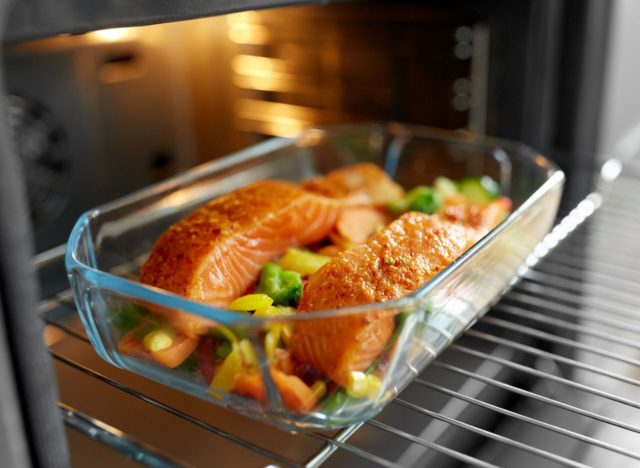Navigating the sea of weight loss advice online can be a daunting task. And who really has the time to sift through countless articles, videos, and research papers to nail down what foods they should add to their plate to melt away unwanted body fat? Fortunately, if you’re a fish lover—salmon, in particular—you’re in luck. Can eating salmon help you lose weight? We chatted with Destini Moody, RDN, CSSD, LD, a registered dietitian and sports dietitian with Garage Gym Reviews, who answers exactly that. Moody dives into the science behind salmon’s potential weight loss benefits to fast-track your way to a healthier, thinner you.
Read on to learn how including more salmon in your diet can help you shed those extra pounds. Then, check out the 10 Best Breakfast Buys at Whole Foods for Weight Loss.
Can eating salmon help you lose weight?


The answer is yes! Salmon can absolutely help you lose weight, and it’s an excellent addition to any healthy diet. According to the American Heart Association, salmon is a fatty fish high in heart-healthy omega-3 fatty acids and protein, which can increase satiety, stave off cravings, and prevent overeating.
Moody tells us, “Salmon is a nutrient-dense food that can be easily added to many recipes across breakfast, lunch, and dinner. You just have to be sure not to consume your salmon with high-calorie sauces or condiments and pair it with plenty of fruits and vegetables for a high-volume, low-calorie meal.”
Here are five ways salmon can help you lose weight.


Now that we’ve established salmon can be a valuable addition to your weight loss journey, here are five ways salmon can help you lose weight, according to Moody.
1. It’s low in calories.
Compared to other fatty fish, salmon is nutrient-dense and low in calories. Per the USDA, a 100-gram serving of Atlantic salmon contains approximately 208 calories. Plus, its ability to absorb seasoning and flavor means incorporating salmon into your diet allows for a nutrient-dense option that supports your weight loss goals without extra calories or sacrificing taste.
“Wild salmon is relatively low in calories, so it can fit comfortably in a weight loss diet,” states Moody. “Keep in mind, though, that some types of salmon are higher in fat and therefore calories. For example, Atlantic salmon has about 30 fewer calories than king salmon, so be sure to check your labels.”
2. It’s high in protein.
“Of the three macronutrients, protein, carbohydrates, and fats, protein is the most satiating,” Moody explains. “This macronutrient promotes the most profound feelings of fullness. Staying fuller than longer can lead to better weight loss success as it can prevent you from overeating or feeling like you’re starving while restricting calories.”
READ RELATED: The #1 Daily Strength Workout To Lose 'Turkey Wing' Fat
Salmon is an excellent lean protein source, providing around 20 grams per 100-gram serving. Its protein content helps keep your calorie intake under control by curbing unnecessary snacking.
3. It increases your metabolism.
Rich in omega-3 fatty acids, salmon can help boost your metabolism. According to a 2021 meta-analysis, these fatty acids enhance your ability to burn calories, making salmon an addition to your diet for those looking to speed up their metabolism and torch calories.
“Salmon is famous for being a good source of omega-3 fatty acids, an essential nutrient the body cannot make on its own and we must obtain from food. Science suggests that this nutrient may also help boost one’s metabolism. Fish oil significantly increased metabolic rate in healthy adults taking 3 grams each day for 12 weeks, according to a recent study,” says Moody.
4. It helps your body burn fat.
Beyond being a lean protein source, salmon is a powerhouse for helping your body burn fat. The omega-3 fatty acids in salmon have been linked to improved fat metabolism, encouraging the body to use stored fat for energy.
“The healthy fats found in salmon may also help to burn body fat and even help one to build muscle,” says Moody. “This is why more and more athletes are starting to supplement with fish oil, as this increase in muscle mass can help keep body fat low and slightly increase metabolism. In one study, a group that took fish oil lost more body fat than a group on the same diet but was given a placebo. The fish group even gained more muscle.”
5. It contains vitamin B12.
Vitamin B12 is an essential nutrient that we must obtain through diet. The National Institutes of Health states that B12 plays a role in energy metabolism and the breakdown of fats, contributing to a more efficient use of calories. Per the USDA, a 100-gram serving of wild Atlantic salmon delivers 3.2 micrograms of vitamin B12, above and beyond the recommended daily value of 2.4 micrograms for healthy adults.
“Salmon is incredibly high in vitamin B12, which plays a critical role in how the body metabolizes fat. Salmon fulfills 127 percent of your daily vitamin B12 needs, and studies have shown that vitamin B12 deficiency is associated with obesity and increased body fat,” says Moody.







